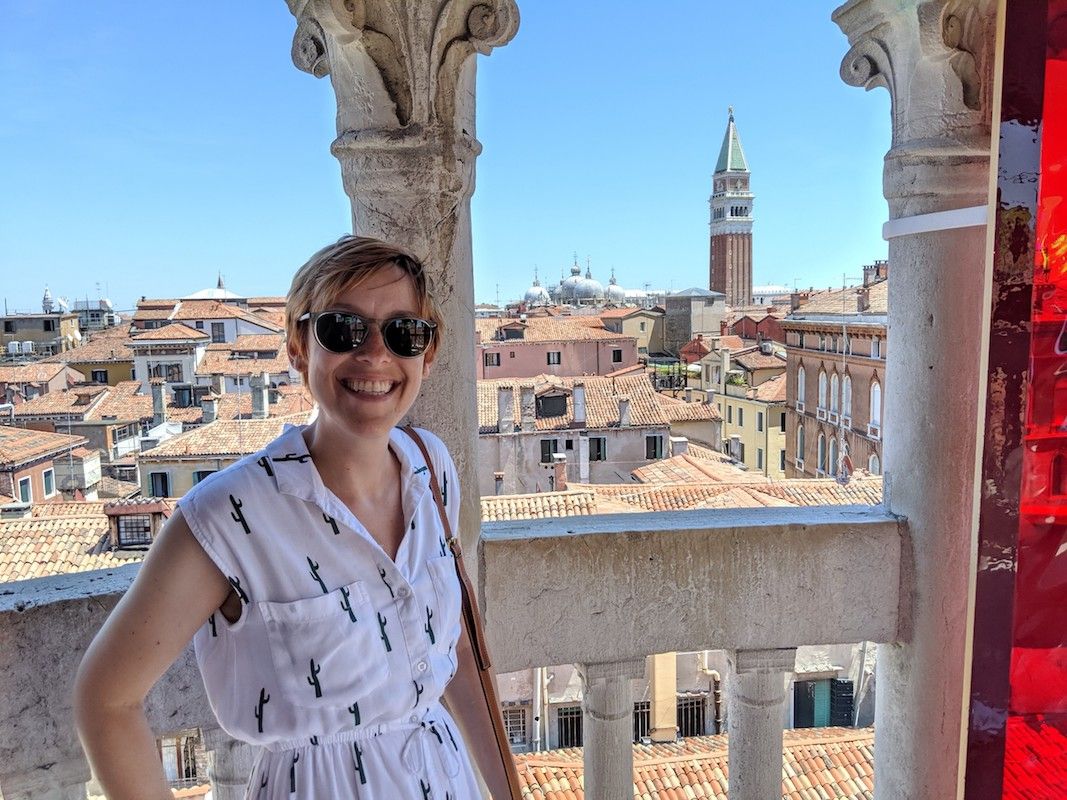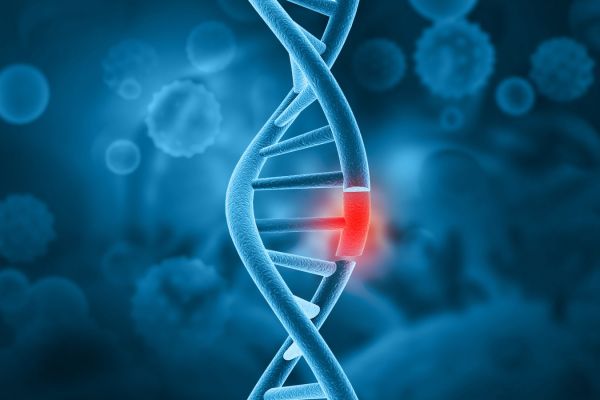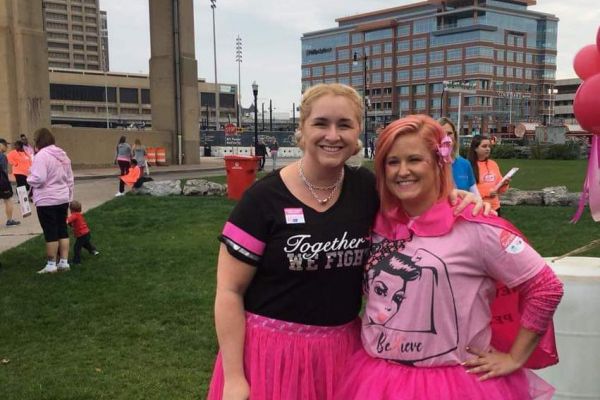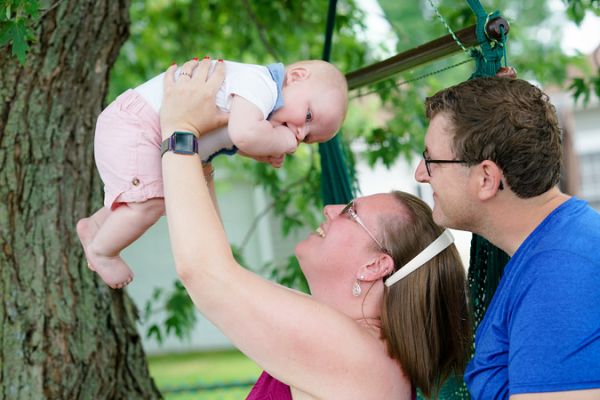Three years ago, Danielle Ossher was excited about starting a new life in Buffalo with her husband, Pete. They had been living in Boston, Massachusetts, where they met in college, but after 10 years, the couple began to think about moving to Western New York, because Pete was from Buffalo. Then Danielle landed a job at The Buffalo News, and that sealed the deal.
Just weeks before their move, however, Danielle discovered a weird lump in her breast. She had a biopsy; it was negative and subsequently diagnosed as a cyst. “The cyst dispersed, and I was told that sometimes these can come back and not to be surprised if it did,” she says. “I was only 30, and so I went on with my life and our move to Buffalo.”
The lump did come back. Danielle wasn’t too worried, but when it didn’t go away after a couple of weeks, she wanted to get it checked. Still, that took another two months, as she had to wait 30 days for her health insurance to begin and then find and get an appointment with a new, in-network general practitioner.
This time, however, the biopsy results were completely different. “It was a complete shock,” she says. “They ran the biopsy three times because I was so young. My doctor offered to connect me with a specialist there or at Roswell Park. I wasn’t from Buffalo and I didn’t know what to do, so I asked her what she recommended. And she said, ‘Go to Roswell Park.’”
Before leaving the physician’s office, Danielle received a call from Roswell Park Comprehensive Cancer Center informing her that they’d be in touch regarding her upcoming appointment in the Breast Center. “It was a very wonderful thing at a very horrible time,” Danielle says. “We were still processing the news and already I felt that everything was being handled.”
Danielle’s first visit with former Roswell Park breast surgical oncologist Steven Edge, MD, FACS, FASCO, brought difficult news. First the diagnosis: Triple-negative breast cancer. “I didn’t know what triple-negative meant, and I didn’t know anything about breast cancer, but ‘cancer’ and ‘aggressive’ are two words nobody wants to hear. I was very lucky to have Dr. Edge. There is a fine line between good information and going down the Google death pit. I didn’t have to wade the Google waters. Dr. Edge gave us all the information we needed to know.”
Genetic testing also revealed that Danielle had inherited a mutated BRCA1 gene, which was likely responsible for her breast cancer diagnosis at such a young age. Women who are BRCA1-positive have an increased risk for developing breast cancer (particularly the aggressive triple-negative subtype) as well as ovarian and pancreatic cancer. “I remember thinking that at least one thing needed to go my way, even a little thing to start momentum in the right direction,” she says. “I finally got it when a scan showed that the cancer had not spread.”
In addition to Dr. Edge, Danielle’s treatment plan was also developed by medical oncologist Tracey O’Connor, MD, and radiation oncologist Simon Fung-Kee-Fung, MD. It wasn’t going to be easy. After six months of chemotherapy, she underwent a mastectomy as soon as she was healthy enough. After that healed, she had five weeks of radiation therapy. Because she faced higher risk from the BRCA gene mutation, Danielle opted for removal of the other breast the following summer.
Why a comprehensive cancer center?
“I don’t think I would be here if I had been treated anywhere else. My prognosis was not a given. The doctors were positive, but honest. I had a realistic sense of what I faced. My cancer was scary, and while I know that everybody’s cancer is scary, I knew that my chemotherapy regimen was crafted with the very latest treatments and research.
“Dr. O’Connor is on the cutting edge of treatment development. She always had a next step: If one drug didn’t produce the results we needed, she knew about the next clinical trial.”
In addition, Danielle quickly learned that she would see several more experts beyond her oncologists. “When I think about all the different departments at Roswell Park, I can’t imagine how many specialists and referrals I would have needed. I did it all at Roswell, from physical therapy and genetic testing and counseling to consultation with a plastic surgeon, plus appointments with the high-risk ovarian cancer clinic. I even got my first wig from the Resource Center.”
When I think about all the different departments at Roswell Park, I can’t imagine how many specialists and referrals I would have needed. I did it all at Roswell, from physical therapy and genetic testing and counseling to consultation with a plastic surgeon, plus appointments with the high-risk ovarian cancer clinic. I even got my first wig from the Resource Center.
Challenges as a young adult
Looking back now, Danielle categorizes the challenges she faced into different “buckets.”
“I sigh, because I wish it wasn’t true, but the biggest bucket for me was my appearance. Losing my hair, eyebrows and eyelashes, the skin changes that come with chemo, was very hard. I lived in fear that my fingernails would pop off, because that was entirely possible.
“Many of the products and solutions are not made for people my age. For example, my mastectomy bras have to be special-ordered to get a band size as small as mine. And the clothing styles that conceal such bras are...underwhelming. Does this matter in the overarching picture and the fact that I survived, and I have my life back? No, of course not, but it wasn’t easy.”
Young Adult Program at Roswell Park
Find out more about the services provided by the Young Adult program.
The other bucket of challenges concerned keeping her life on track. “I had just started my job and was getting my career going, but cancer puts your life on pause. I was lucky that I managed to keep working full time and had support from work, but my goals shifted.
“For a while, the goal was simply to keep the wheels on the bus — show up for work and do what I could. I tried to keep the faith and believe that when it was all over, I would be able to kick it back into high gear again.
“I felt incredibly well cared-for the entire time, and that meant a lot to me, not having roots or my family here. During chemotherapy I fell down the stairs and broke two front teeth. When you’re on chemotherapy you’re told to report any falls, so I called the clinic to let them know that I had a fall, and that I was fine, but broke my teeth.
“Dr. O’Connor called me back to see how I was and said, ‘I know you just moved here; do you even have a dentist?’ Which of course, I didn’t. She connected me with a dentist to get my teeth repaired the same day.
“That’s what my experience was like at Roswell Park.”
Editor’s Note: Cancer patient outcomes and experiences may vary, even for those with the same type of cancer. An individual patient’s story should not be used as a prediction of how another patient will respond to treatment. Roswell Park is transparent about the survival rates of our patients as compared to national standards, and provides this information, when available, within the cancer type sections of this website.



